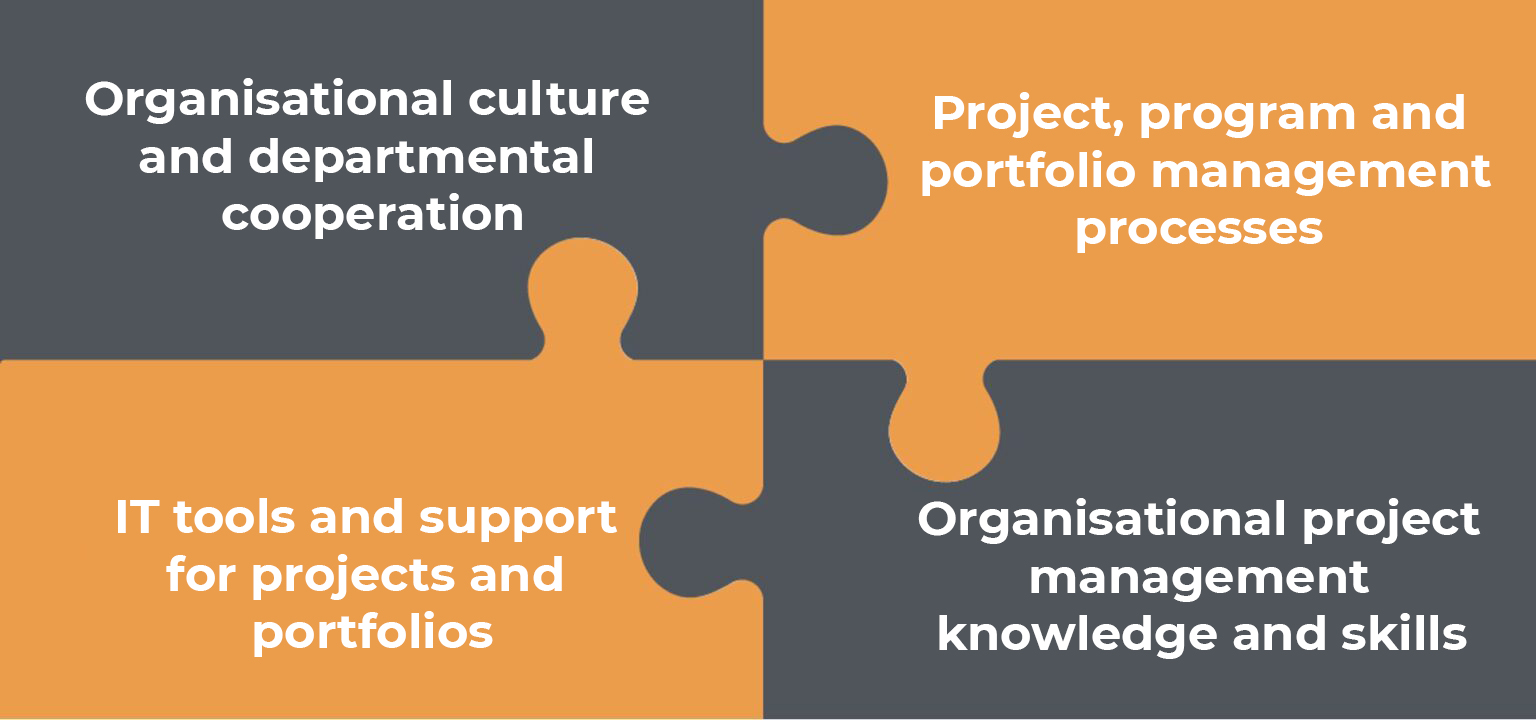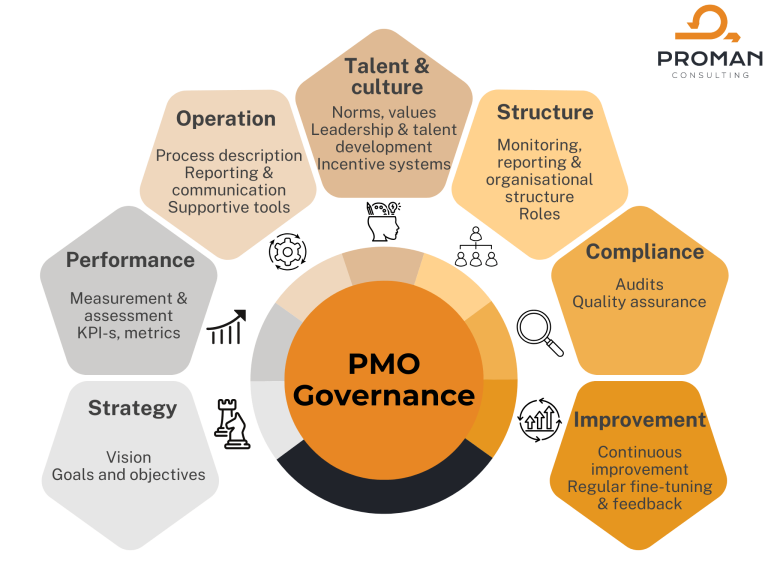IMPROVING ORGANISATIONAL PROJECT MANAGEMENT
WHEN TO DEVELOP ORGANISATIONAL PROJECT MANAGEMENT MATURITY?
Even though many organisations prioritize projects, they often don't yield the desired results. The required measures to enhance project effectiveness remain ambiguous for many organisations.
From our experience, when encountering such scenarios, it might be essential to assess and potentially enhance the following four dimensions:
- Organisational project management expertise and abilities,
- Shaping the organisational culture in line with with inter-departmental collaboration,
- the project, program and portfolio management processes,
- and the utilised IT and support tools tailored for projects and portfolios.
What happens after contacting us?
The continuous involvement of key stakeholders is critical to the success of project management maturity development, so we strive to ensure that development is driven by the needs of senior and operational managers, with the continuous involvement of key stakeholders in the implementation.
1. Free consultation: understanding needs, goals, options
2. Quick survey, root cause exploration
3. Senior management presentation, setting realistic targets
4. Preparing a top-level roadmap and proposal
5. Contracting
6. Providing our expertise within the commonly agreed framework
Our Featured Experts

Domonkos Végh

Dóra Szabó

Orsolya Szenkovits-Varró

Fanni Leila Varga

Zsolt Czimbalmos
HOW CAN WE HELP?
If your organisation needs to improve the effectiveness of organisational project management, we can help developing practical, workable solutions in the following areas:
- Project management process development (traditional, agile and hybrid solutions), and project governance development
- Project Portfolio Management process, work-flow and supporting IT solution implementation
- Project selection and demand management process development, prioritisation and categorisation criteria design
- Improving cooperation among collaborating departments
- Project, programme and portfolio office design, PMO development
- Project Controlling processes and KPI definition
- Clarification of responsibilities, authorities and roles
- Programme or project support and management of such endeavors

BASIC ELEMENTS OF DEVELOPMENT
ORGANISATIONAL PROJECT MANAGEMENT KNOWLEDGE, SKILLS
The effective and successful implementation of projects cannot be achieved without the key stakeholders (project members, project managers, contractors, suppliers) speaking the same language. In addition to this, the methodological knowledge and skills of project managers can also have a big impact on the results. Appropriate ways to strengthen them could be tailor-made trainings, project coaching sessions or joint workshops.
PROJECT, PROGRAMME AND PORTFOLIO MANAGEMENT PROCESSES
It's futile for individuals to possess extensive knowledge and experience if the associated project management processes aren't properly regulated.Such gaps elevate the risk of errors. To mitigate this, it's crucial to develop and standardise user-friendly processes, by clearly defining roles and responsibilities.
LINKS BETWEEN ORGANISATIONAL CULTURE AND ORGANISATIONAL UNITS
This kind of change and development cannot take place without support from senior management. It's worth examining if project or programme offices align with the company's main goals and how they can be integrated into the existing structure. Another important factor is the focus on the career growth of project managers', that can lead to lower staff turnover and help retain company expertise . We're ready to help shape these aspects if needed.
IT SUPPORT
There's a good range of tools available today to assist with projects, from cloud solutions to in-house systems as well. Regardless of your choice, it's essential to have your processes and roles defined beforehand. Note that systems should streamline our work and improve efficiency, rather than adding complexity or burden!
Role of PMOs
Central to the evolution and structure of the mentioned elements are the project management offices, often referred to as PMOs.
Of course, it is not always necessary to set up project management offices, it depends largely on:
- the number of projects,
- the importance of projects in the organisation
- and the state of organisational culture as well.
When an organisation handles a considerable number of high-priority projects annually, the role of project offices becomes pivotal. Such offices can contribute to:
- Shaping the organisational culture in line with project portfolio management,
- Ensuring proper preparation for project needs and ideas
- Providing strategic oversight for programmes as well.
The operational emphasis of these project offices spans assisting project managers, overseeing project, programme, and portfolio management processes, to potentially recruiting project managers among other more specific responsibilities.
Project governance - the key to progress

- Strategy - Real, long-term progress is sustainable only when we have a clear goal in sight. Without defined success criteria, clear objectives, and alignment of project management with the overarching corporate strategy, the path to development can become ambiguous. Project management isn't the final destination; it's a tool to help us reach our objectives.
- Perfromance - Stakeholder expectations, metrics, objective performance indicators and systems greatly increase motivation, make operations transparent and provide a motivating, transparent and predictable career path. A career path can help reduce staff turnover.
- Operation - Ad-hoc project management rarely leads to results. No matter how good the people and teams we work with, it is typically necessary to have some kind of unified work plan. Establishing processes, responsibilities, authorities, supporting tools and preferred communication channels helps management to keep an overview of projects, anticipate problems, identify problem projects and ensure a consistent, coordinated and comparable operation.
- Talent and culture - The core values, norms, and culture of an organisation significantly influence its performance. Engaging appropriately and choosing the right management approach enhances dedication to projects. Leadership isn't innate; it's a skill that can be honed. Especially considering today's resource limitations, it's crucial to focus on nurturing and inspiring talent, who are the future's pivotal players.
- Structure When we're clear about our goals and the path to achieve them, it's essential to back them up with a fitting structure and organisational setup. Most are familiar with terms like steering committees, supervisory boards, and change control boards. However, defining how they operate and their structure is crucial. It's beneficial to determine aspects such as whether these entities should be virtual, temporary, or permanent. Additionally, understanding what these roles contribute to or expect from projects, the platforms they engage with, how they source information, and which support areas enhance project delivery is key.
- Continuous improvement - Every system has room for growth and enhancement. Based on our observations, no organisation can truly claim to have achieved perfection. Embracing continuous improvement can consistently elevate operational efficiency. When an organisation proactively drives its growth, it positions itself as a self-evolving and learning entity.
- Compliance - Maintaining adherence to processes and operational standards is crucial. Though the primary responsibility lies with the project team, there are supportive tools available. Conducting audits is a constructive approach to ensure compliance and to identify areas ripe for further improvement.
How do we work?
We prioritize delivering tangible value over merely producing documents and accounts. After our preliminary conversations, our approach unfolds as:
- Gaining a deep understanding of the organisation and pinpointing challenges and hurdles
- Setting clear, measurable success metrics, evaluated both during and at the conclusion of our engagement
- Collaborating closely with trusted partners, facilitating open dialogue, continuous cooperation through workshops and discussions
- Welcoming regular feedback, continuous, joint evaluation of results
- Committing to tasks where we see a clear path to success that we also believe in
- Continuous change management focus to capture all benefits
- Applying our expertise and adopting best practices that have proven effective
- Prioritizing simplicity, delivering solutions that are efficient and uncomplicated

 Designabc
Designabc